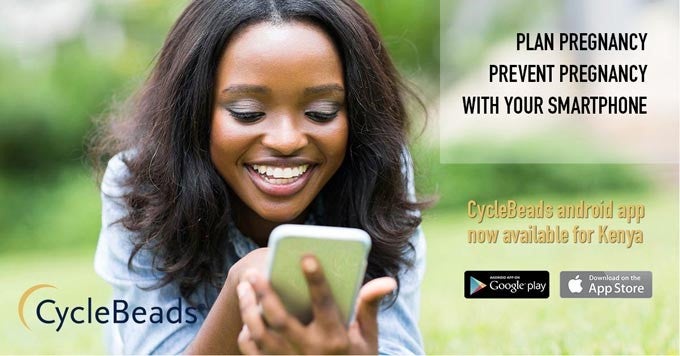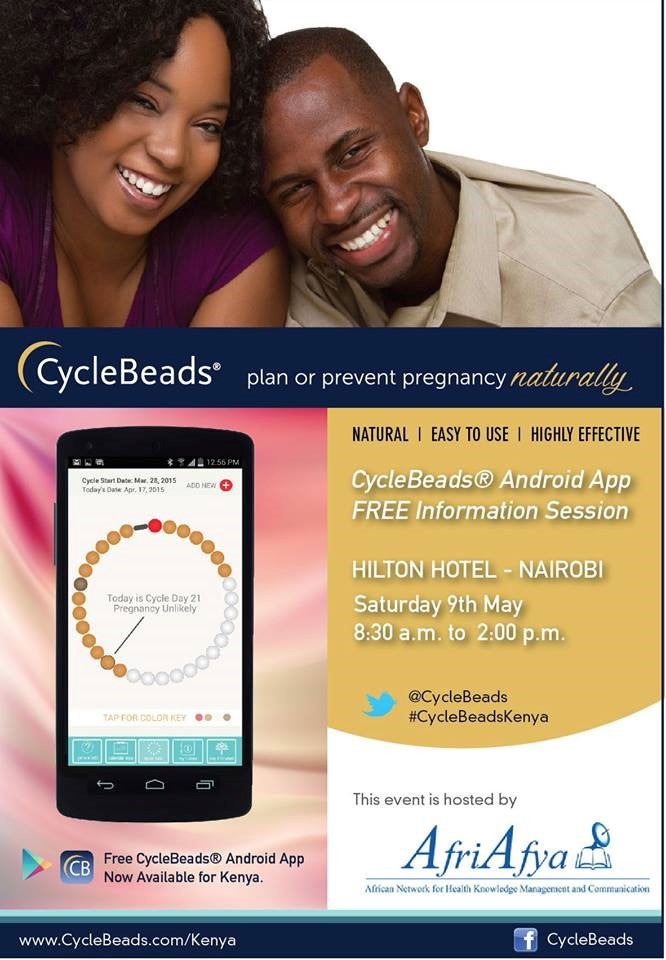Reaching women where they are: 3 things we’ve learned about researching & distributing apps
If you’re trying to reach women in Nairobi with a family planning app, what’s the easiest, cheapest, and best way to do it? For the CycleBeads® Android app, developed by Cycle Technologies, it could be social media, a local NGO called AfriAfya or old fashioned word-of-mouth. The app enables a woman to use the Standard Days Method® of family planning, which can be used for planning or preventing pregnancy, or period tracking.
The Institute for Reproductive Health at Georgetown University (IRH) partnered with Cycle Technologies and local research groups iHub and Research Solutions Africa to assess how best to introduce the CycleBeads app to women in Nairobi. We wanted to know: which distribution channel is most likely to reach women in need of family planning? Which channel best enables women to correctly and consistently use the app?
After just four weeks of promoting the app through facebook and AfriAfya’s network, over 2,600 people in Nairobi downloaded the app. We recruited a sample of these users into a study and followed up with 189 of them over three months. During that period, we interviewed them three times, collecting data about their background, previous family planning use, and experiences with the app. 22 users also participated in in-depth interviews. From these interviews, we learned that women were able to download the CycleBeads app and answer the screening questions. Most (over 50%) said that they were using the app for period tracking. Of the ones who were using it for pregnancy prevention, over 1/3 brand new to family planning, and hadn’t been using any method before the CycleBeads app.
Here are some interesting things we’ve learned about distributing apps:
Social Media

What we did: Cycle Technologies used their existing Facebook page and social media platform to target women ages 18-35, living in Nairobi. They created a suite of Kenya-appropriate content and promoted it through paid ads. This strategy was very successful at encouraging downloads – approximately 2,100 people downloaded the app in a four week period through social media ads.
What we learned: Facebook ads were a successful and cost-effective way to promote the CycleBeads app. In the end, the cost per customer acquired was around $.47. Of course, that only means that the person clicked on the ad and downloaded the app; we are monitoring how many of those people continue to interact with the app over time. Preliminary data suggests that digital campaigns may be particularly effective at reaching women with unmet need. Among women who were using the app for pregnancy prevention and had heard about it from the digital campaign, preliminary analysis shows that 46% had previously not been using any method of pregnancy prevention.
Educational Meetings

What we did: AfriAfya, a Nairobi based NGO with a focus on health education, hosted a series of four meetings to educate men and women about reproductive health, family planning and the CycleBeads app. They offered support for people in downloading the app and answered follow-up questions.
What we learned: The meetings were enthusiastically received, and word spread from the meeting attendees to others in the community. Around 300 people attended a meeting – 28 of our research participants came from these meetings, and 20 other participants heard about the app from someone who attended the meeting. These meetings reached people from a range of income levels, and all of them described the app’s screening process as easy (96%) or moderate (4%).
And here’s what we’ve learned about researching apps:
Research Recruitment
What we did: We recruited users into the study over a 30 day period through two different pathways.
- Face-to-face. At meetings, AfriAfya told participants about the research and got contact information from those who were interested in the study.
- An in-app pop-up: Cycle Technologies added a feature into the app itself where, after a user in Kenya downloaded the app and entered their first period date, a pop-up appeared inviting them to participate in research and collecting their name and phone number if they did.
iHub and Research Solutions Africa then contacted all interested users to confirm that they wanted to participate, guided them through the informed consent, and scheduled the first interview.
What we learned: We were surprised by the number of people who were willing to sign up for research through a pop-up within the CycleBeads app. Over 2,600 people downloaded the app during the recruitment period, and 7% of them entered their name and phone number into the pop-up. With Facebook advertising, this process cost ~$7 per research participant.
These days, there are a growing number of apps for health and well-being. Our data will provide insights to this blossoming and understudied market. Data is still coming in, and we’re looking forward to sharing more results soon!
Learn more
- We’ll be at the International Conference on Family Planning! Visit our poster on Tuesday, November 10 at 2:20pm: “Testing usability and distribution models for a mobile family planning method in Nairobi, Kenya”
- Read about our lessons learned from the app usability testing.
- AllAfrica feature: “Cyclebeads APP Helps Kenyan Women Prevent and Plan Pregnancy With Just a Smartphone”
- Download the CycleBeads app to experience the tested technology for yourself.
- Join the conversation online: @IRH_GU @iHub @CycleTechGlobal
 Where We Work
Where We Work  Press Room
Press Room  FACT Project
FACT Project  Passages Project
Passages Project  Learning Collaborative
Learning Collaborative  Search All Resources
Search All Resources  Social Norms
Social Norms  Fertility Awareness Methods
Fertility Awareness Methods